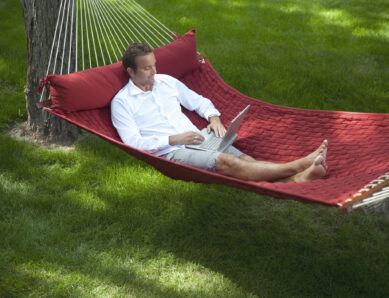For millions of us, it’s getting harder to know who we are anymore. We’re not commuting to work, not wearing a suit or putting on cosmetics every morning. We’re not sitting among our co-workers or meeting our customers face-to-face. Our identity is in crisis.
In the wake of COVID-19, we’re working from home. And who we are and how we live has changed. The boundaries that separate work from home are blurred, especially for parents.
Out-of-Office Identity Crisis
Many people feel liberated from corporate culture, with their boss no longer sitting across the aisle. Saved too from the grind and the expense of the commute.
But some are feeling grief and confusion because they don’t feel professional working at home, or just don’t know who they are anymore. Not an adolescent or midlife version, but still an identity crisis.
Anthropologists have long pointed out that our work is the bedrock of our identity. And now we’re working in isolation. There isn’t the presence of our colleagues to reassure us. How they interact with us, rely on us, treat us, laugh at our jokes – it all constantly reinforces our sense of self.
Gone too are the rigors and demands of the workplace. So do we still feel professional at home? Does it matter if we’re not in the office? How do we maintain our professionalism WFH? We asked our followers on social media – and people in our own Mind Tools virtual office – for their experiences and insights.
I Do, Therefore I’m Professional
LernChance told us on Twitter that location doesn’t matter. He said: “Short answer: No. As long as I’m proficient in what I do I feel ‘professional,’ regardless of where I work.”
On LinkedIn, logistics specialist Mennah Tullah has been embracing the serenity, and not tangling with an identity crisis. “It is more effective than the office. I finish my task, have free time, no unnecessary arguments, just work peacefully.”
Emerald Works Content Product Manager Sean Brown admitted: “I feel less professional in my image at home than the office, but I get more done WFH. At first, I did still try to maintain an office image. I used to work in banking. But now, due to the pandemic, it’s far more usual to see people less formal/professional in their appearance.”
Mean Business
And the identity he projects was cause for concern for Mind Tools writer Jonathan Hancock. He said: “When working from home started, I was anxious about keeping my ‘real’ life hidden, in case it harmed my professionalism – particularly with external clients.
“But I’ve become more relaxed over time. I’ve found that the occasional noise off camera or interaction from a child/pet can actually help a conversation, and remind people just how professional you’re being by managing it all!”
Finnish Head of Business Development Pontus Kihlman says that WFH has not had a negative effect on his sense of identity or professionalism. “Quite the opposite. Without actually seeing what our colleagues are up to all the time, now:
a) We probably step up our game, because we imagine our best workmates as superhumans, and feel we need to keep up with them.
b) We can feel fairly sure that the slackers at work are slacking even worse now, thus passively making us look and feel more professional in relation to them. Before this, we were probably all just regressing towards the mean.”
Style Can Mean Substance
For Gary Gruber, it’s been business as usual. He told us on Twitter: “For those of us who worked from a home office previously, with corporate HQs located elsewhere, it’s not much of a change personally or professionally.”
Mind Tools writer Simon Bell is an old hand at WFH, but guards against distractions. “I do need to be ‘in the flow’ to work effectively. And it’s very easy to become distracted when you aren’t physically surrounded by people working with common purpose. So I give my day as much ‘office-style’ structure as I can.”
In contrast, Mind Tools Managing Editor Charlie Swift has found his professional identity reinforced by working at home. He said: “My neighbors and family see and hear me working now – they reassure and remind me of the fact and importance of my job!
“I work on the ground floor by a window, so people passing by see me with my headphones on, talking on a call, typing. The mail delivery woman waves to me and I return the acknowledgement. My friend up the road takes a look, in case I’m free to join her for exercise, but she won’t disturb me. And indoors, my partner tiptoes through the room out of shot from video calls but hears me sharing expertise.
“I’ve been more of my full self with all these people, as my work role isn’t happening someplace else, hidden from them. They can see who I am.”
Our article, Working From Home, has practical advice about staying productive and professional while also looking after your personal needs.
Have you suffered an identity crisis WFH? How do you help yourself to feel professional at home? Join the conversation and leave your tips in the Comment section, below.




